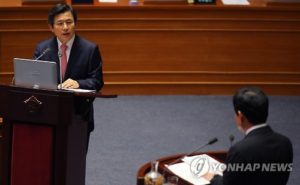
Yonhap:
South Korea’s ruling and opposition parties on Wednesday continued to debate over whether Seoul should consider its own nuclear armament as an option to defend the country amid escalating tension on the Korean Peninsula sparked by Pyongyang’s provocations.
Following North Korea’s launch of submarine-launched ballistic missiles (SLBMs) as well as its fifth nuclear test, a rising number of hawkish lawmakers, mainly from the ruling Saenuri Party, claimed that South Korea must consider developing its own nuclear weapon.
“We need to consider every option, including deploying tactical nuclear weapons, developing our own nukes, striking North Korea’s related facilities, and demolishing Kim Jong-un’s regime,” Rep. Lee Cheol-woo of Saenuri said during an interpellation session held at the National Assembly.
“South Korea should not delay the move in fear of international sanctions or possible discord with China. This is a chance to conclude North Korea’s nuke issue once and for all,” Lee added.
The Saenuri lawmaker added Seoul should continue its talks with Washington to deploy tactical nuclear weapons on the Korean Peninsula.
Rep. Yoon Sang-hyun from the ruling party, who has been opposing such hawkish claims, also said tactical nuclear weapons can be an option if North Korea crosses the line.
“We can have the United States deploy bombers or nuclear-powered submarines,” Yoon said, adding such efforts must be done if North Korea conducts additional nuke tests or launches more missiles.
Yoon, however, said using nuclear weapons may devastate the Korean Peninsula, adding it will be better to induce North Korea to embrace democracy.
Rep. Kim Jin-pyo of the main opposition Minjoo Party of Korea also supported the deployment of tactical nuclear weapons, adding Seoul will have no other choice if China and Russia continue to make sluggish moves on imposing effective sanctions on the North.
In response to such claims, Prime Minister Hwang Kyo-ahn reiterated that the South Korean government will continue to support denuclearization of the Korean Peninsula.
Hwang added Seoul will continue to coordinate with Washington to deal with North Korean issues, although he agrees that more sanctions must be slapped on Pyongyang.
“If North Korea continues to choose the path of nuclear development, having conversations with Pyongyang will only help them earn more time so they can make more progress,” Hwang also said, adding the government is still not considering having talks in the face of provocations.
Hwang also pointed out that North Korea conducted a nuke test even when its residents were suffering from floods, adding Pyongyang should have prioritized its flood-stricken residents.
Defense Minister Han Min-koo vowed to make various moves against North Korea’s nuke provocations, adding Seoul is capable of defending itself from Pyongyang’s nuclear weapons.
“The Seoul-Washington military alliance, as well as South Korea’s political, diplomatic, intelligence and economic capabilities will curb Pyongyang’s nukes,” Han also said during the interpellation.
Han then made clear that there are no health risks associated with the Terminal High Altitude Area Defense (THAAD) battery’s radar system.
The defense minister also said South Korea will do whatever is necessary to protect the battery from attacks.
“The THAAD system is the best weapon we can have in the face of advances made in North Korean nukes and missiles,” Han said, adding the deployment must be done even if Beijing and Moscow oppose the move. He said Seoul will push for deployment even if such a step can potentially hurt the national economy.
The minister said the THAAD battery will work with other military systems in the event of a North Korean attack, rebutting claims raised by some that the advanced U.S. missile defense system cannot defend the country in the event of a full-fledged attack.
